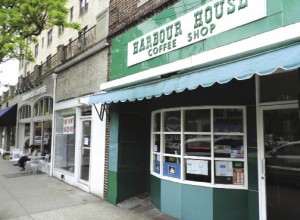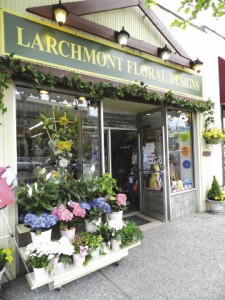
Graham, a Rye resident, owns boutique retail shops Pink on Palmer and Clutch in Larchmont and Pink Deux in Rye Brook. She opened Clutch a year ago after a similar clothing and accessories retailer that had been in Larchmont went out of business and the property next door to Pink on Palmer happened to become available.
“It was like a good perfect storm when you have all the right ingredients,” said Graham, who opened Pink on Palmer, a small beauty products retailer, in 2003 on the corner of Palmer Avenue and Chatsworth Avenue. “So it just seemed like the right thing to do, even in a bad climate.”
As the U.S. Small Business Administration kicks off National Small Business Week beginning May 20, small business owners in Westchester County have struggled to expand their businesses and face stagnant revenue streams despite now being a few years removed from what economists have deemed the end of the Great Recession in mid-2009.
Graham and several of her business-owning counterparts in Larchmont last week said business was not noticeably down, but it wasn”™t improved either, compared with last year.
“You have a couple of good days and you go, ”˜Oh my god, it”™s back, it”™s great, it”™s super,”™ and the next thing you know you have two dead days,” Graham said. “There is no consistency, which for a small business is hard.”
While consumer spending is projected to rise this year ”“ with a recent Bloomberg News survey of economists projecting 2.1 percent annual growth ”“ small retailers in particular are struggling to compete with brand names and mass-market retailers that can offer lower prices and more promotions.
“If you”™re a small store, here”™s what you can”™t do: you can”™t play in a price war,” said Howard Davidowitz, chairman of Davidowitz and Associates Inc., a national retail consulting and investment banking firm headquartered in New York City. “So a lot of independents on Main Street, with the customer more focused on prices, have a major problem.”
In Larchmont ”“ like in many towns across Westchester ”“ residents have made a concerted effort to shop local.
“This town here in Larchmont is a fabulous town, a lot of great customers,” said Elizabeth Alfieri, owner of Larchmont Floral Designs for the past 19 years. “They”™re loyal, and we”™re good to them.”
Jennifer Siegel, manager at Anderson”™s Book Shop in Larchmont, said customers recognize they can get a book cheaper from retailers such as Amazon.com Inc. or Barnes & Noble Inc., but said people “don”™t want to see another business go under.”
“We”™re very lucky ”“ we have a very wonderful, loyal fan base,” Siegel said.
Loyalty, however, can only carry independent retailers so far.
In the flower business, there is always demand ”“ it is just a question of who consumers turn to, Alfieri said.
“You have a baby born every day and somebody dies every day. That”™s the nature of the business. I hold my own ”“ everybody gets a piece of Lizzie.”
But, she said, “We”™ve seen a change through the years.”
“Flowers are sold everywhere ”“ the big mass marketers, Home Depot, Trader Joe”™s. But they don”™t need to sell flowers. I need to sell flowers. This is my life. Those mass merchandisers have cheapened the flower business.”
Siegel said the rise in popularity of e-books has had an obvious impact on sales at Anderson”™s Book Shop, adding that the store”™s owners have seen zero profits over the past several years.
Asked whether the store has experienced any hint of a rebound in the wake of the recession, she responded, “No, not at all.”
Nationwide, small business optimism rose in April, according to a monthly survey from the National Federation of Independent Business.
However, this month”™s national employment report fell far below projections with just 115,000 new jobs in April.
With the lackluster employment report, in addition to the continuing effects of the European debt crisis, NFIB chief economist Bill Dunkelberg projected there will most likely be “only small improvements on Main Street in optimism or hiring and spending this year.”
The bottom line, Davidowitz said, is that small businesses “are in terrible shape.”
“The consumer has less money to spend,” he said. “Median family income for a family of four is down 10 percent. That is an astounding number. They just don”™t have as much money, so they”™re looking to get the best deals they can.”
The result is that independently owned small businesses, “the guy with the small food store, the guy with the bodega, the guy on Main Street who”™s got a general hardware store,” are going to continue to struggle, Davidowitz said.
“The consumer is looking for price, and that”™s not what they offer; they offer service,” he said. “That”™s what you”™re going to continue to see.”

- HOME
- E-EDITIONS
- MEMBERS/LEADS
- INDUSTRIES
- SMALL BUSINESS
- EVENTS
- GOOD THINGS
- PARTNER INSIGHTS
- ADVERTISE
- SUBSCRIBEACT NOW
- HOME
- E-EDITIONS
- MEMBERS/LEADS
- INDUSTRIES
- SMALL BUSINESS
- EVENTS
- GOOD THINGS
- PARTNER INSIGHTS
- ADVERTISE
- SUBSCRIBEACT NOW
Recovery just out of reach for independent retailers
0
Patrick Gallagher
Bio: Fairfield County Bureau Chief Staff Reporter Westchester County Business Journal Covers: Economy, energy, government, infrastructure and public works projects, law, media, technology Phone: (914) 694-3600, ext. 3017
Leave a Reply Cancel reply
World News
U.S. and world news for Jan. 31
Investigators recover recorders from airliner involved in midair collision The cockpit voice recorder and flight data recorder from the regional...
No Result
View All Result
Latest News
Hochul reported trying to convince Trump not to kill congestion pricing
President Donald Trump and New York Gov. Kathy Hochul are expected to speak with each other again...



















